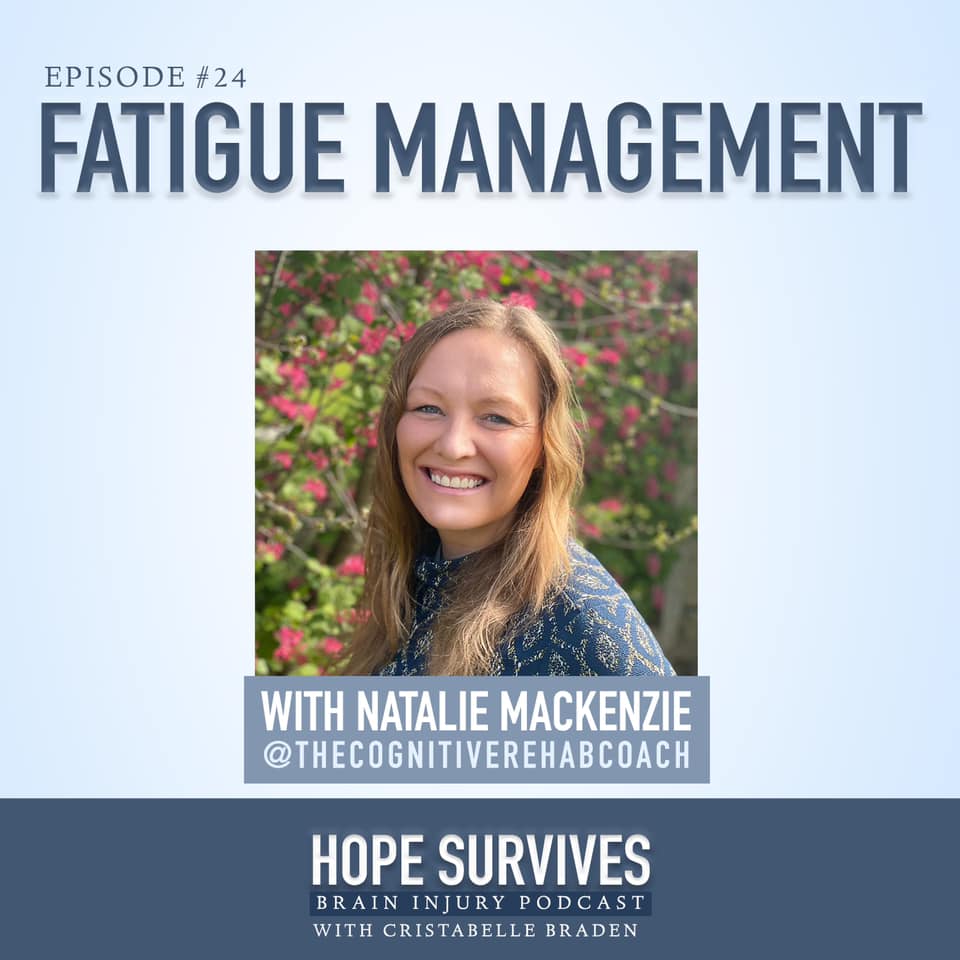After a brain injury, fatigue can become one of the most draining and difficult parts of getting through the day or week.
Today we going to talk about some strategies and tips on how to manage that fatigue with Natalie Mackenzie, who has worked in the field of Neuro Rehabilitation for 20 years. Part of this is learning about what Natalie calls the 3 P’s: Planning, Prioritization, and Pacing.
Hope Survives | Brain Injury Podcast - Episode 24
Video Interview Segment:
MEET OUR GUEST:
Natalie Mackenzie has worked in the field of Neuro Rehabilitation for nearly 20 years. As a Cognitive Rehabilitation Therapist and Certified Brain Injury Trainer, she has worked with hundreds of families and clients as Founder and Director of a Community Cognitive Rehabilitation service in the UK.
Natalie is also known as The Cognitive Rehab Coach, providing online support and education, blog writing, and contributions to the industry magazine, The NR Times. Natalie has trained a huge number of employees, as well as other industry professionals and spoken at conferences, whilst holding board positions for charities. She strives to increase standards in long term brain injury rehabilitation in the UK and providing more support to those struggling with any level of brain injury.
Natalie holds a BSc in Psychology and MSc in Cognitive Neuropsychology, and is currently completing her ADHD Coaching qualification with IACT. Natalie has a wealth of experience and training in the field both with adults and children, across severities of TBI from concussions to severe injuries. Natalie focus on a large range of goals, identified with the client, from day to day functional skills to return to work or education settings.
Natalie works closely with clients and families to educate and provide support with understanding the challenges of living with a hidden disability. Strategies, insights and training is provided to help navigate the pathway, with a holistic approach. As a qualified Clinical Hypnotherapist, Natalie also provides sessions to deal with anxiety, stress, adjustment and general relaxation to all ages.
Areas of expertise include fatigue management, insight and awareness, adjustment and formation of self and strategy implementation. As well as enjoying some geek level brain education to explain in simple why the brain doesn’t quite work the way we want it to sometimes! But with huge emphasis on the strengths of strategy implementation and adjustment to change of roles and formulation of changed values post injury.
Find out more on Facebook and IG: follow The Cognitive Rehab Coach for more information. https://www.facebook.com/thecognitiverehabcoach IG: @thecognitiverehabcoach
About This Podcast
Have you or a loved one experienced a traumatic brain injury, stroke, concussion, or ABI? This podcast is for you. Sharing hope, support, and education for brain injury survivors, caregivers, and families. Hosted by award-winning TBI survivor, advocate, and singer/songwriter Cristabelle Braden, this is an uplifting podcast to bring hope to your darkest days. Subscribe and stay tuned for messages of encouragement, interviews with professionals, and survivor stories.
ABOUT CRISTABELLE:
Cristabelle Braden is an award winning singer/songwriter, keynote speaker, writer, podcast host, brain injury survivor & advocate. www.cristabellebraden.com


Stacie Williams
Hi there, I am always looking for tips on handling fatigue. I am a very high level survivor of an auto accident in Naperville, IL on one of the worst accident days in Chicagoland history. Within a year or two after the accident, I was sleeping 12-16 hours/day. As far as i know, I'm the only woman to have survived the trauma a hemorrhage that I faced as long as I have. I was given 10 years on the outside and it's now 17 1/2 years out. I have severe tooth decay but, with Christian Science, higher level of supplements and hot yogas, I am otherwise pretty well. I don't have any outward signs of trauma. The ER didn't put a shunt in that day and the trauma surgeon that I saw months later made the decision that it would be worse to operate at that time despite the dried blood crusted on the gray matter of the left side of my brain and that had dripped into the spinal column. I am the only one of my kind that I know of. Any advice and support and links to the right support network that you can give me would be appreciated. I lived out in the Portland, OR area where they don't treat trauma cases unfortunately and I haven't had any sort of medical treatment for it in 15 years. However, the MRIs still exist at the neurosurgeon's office in Chicagoland. I am in Eben Alexander's latest book "Living In A Mindful Universe". I also have a nearly 11 year old son and we recently relocated back to my home state of Ohio. Looking for resources, support and care. Thanks